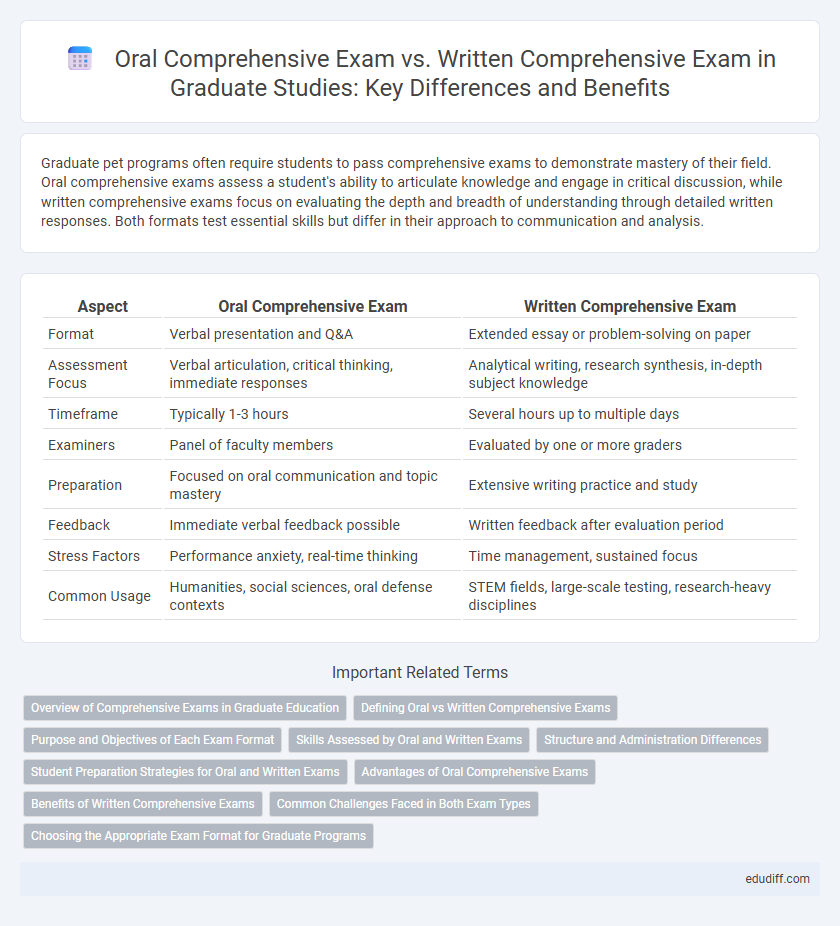Graduate pet programs often require students to pass comprehensive exams to demonstrate mastery of their field. Oral comprehensive exams assess a student's ability to articulate knowledge and engage in critical discussion, while written comprehensive exams focus on evaluating the depth and breadth of understanding through detailed written responses. Both formats test essential skills but differ in their approach to communication and analysis.
Table of Comparison
| Aspect | Oral Comprehensive Exam | Written Comprehensive Exam |
|---|---|---|
| Format | Verbal presentation and Q&A | Extended essay or problem-solving on paper |
| Assessment Focus | Verbal articulation, critical thinking, immediate responses | Analytical writing, research synthesis, in-depth subject knowledge |
| Timeframe | Typically 1-3 hours | Several hours up to multiple days |
| Examiners | Panel of faculty members | Evaluated by one or more graders |
| Preparation | Focused on oral communication and topic mastery | Extensive writing practice and study |
| Feedback | Immediate verbal feedback possible | Written feedback after evaluation period |
| Stress Factors | Performance anxiety, real-time thinking | Time management, sustained focus |
| Common Usage | Humanities, social sciences, oral defense contexts | STEM fields, large-scale testing, research-heavy disciplines |
Overview of Comprehensive Exams in Graduate Education
Graduate comprehensive exams evaluate a student's mastery of core disciplinary knowledge and readiness for advanced research or professional practice. Oral comprehensive exams assess critical thinking, verbal communication, and the ability to synthesize and defend ideas in real-time, often involving a panel of faculty members. Written comprehensive exams focus on extensive knowledge recall, analytical writing skills, and the ability to organize and present complex information coherently under timed conditions.
Defining Oral vs Written Comprehensive Exams
Oral comprehensive exams involve verbal questioning sessions where graduate students must articulate knowledge and demonstrate critical thinking fluently, often under direct faculty evaluation. Written comprehensive exams require students to provide detailed, structured responses in essay or short-answer formats, testing depth of knowledge and analytical skills in a timed, paper-based or digital environment. Both exam types assess a candidate's mastery of subject matter but differ in delivery, interaction, and expression of understanding.
Purpose and Objectives of Each Exam Format
Oral comprehensive exams assess a graduate student's ability to articulate knowledge, demonstrate critical thinking, and engage in scholarly dialogue, emphasizing verbal communication and immediate problem-solving skills. Written comprehensive exams measure a student's depth of understanding, analytical writing ability, and capacity to synthesize information in a structured format, prioritizing clarity and coherence in written responses. Both formats aim to evaluate mastery of core subject matter, readiness for advanced research, and qualifications for degree progression.
Skills Assessed by Oral and Written Exams
Oral comprehensive exams primarily assess students' verbal communication skills, critical thinking, and ability to articulate complex ideas under pressure, revealing depth of understanding and real-time problem-solving abilities. Written comprehensive exams evaluate analytical writing, organization of thoughts, subject knowledge, and the capacity to construct well-supported arguments in a structured format. Together, these exams measure diverse competencies essential for graduate-level mastery and professional readiness.
Structure and Administration Differences
Oral comprehensive exams typically involve a panel of faculty members who assess a graduate student's ability to verbally articulate knowledge, with questions posed in real-time that test critical thinking and subject mastery. Written comprehensive exams require students to respond to structured prompts or essay questions within a fixed time frame, allowing for in-depth articulation of concepts and detailed written analysis. The administration of oral exams often includes a scheduled, synchronous session evaluating immediate responses, while written exams are usually completed under timed, asynchronous conditions, ensuring thorough documentation of knowledge.
Student Preparation Strategies for Oral and Written Exams
Effective preparation for oral comprehensive exams involves practicing verbal articulation of key concepts and anticipating potential questions to build confidence and clarity. Written comprehensive exam strategies prioritize organizing study materials into structured outlines and rehearsing timed essay responses to enhance coherence and depth. Tailoring study approaches to the format ensures mastery of content and reduces exam anxiety for graduate students.
Advantages of Oral Comprehensive Exams
Oral comprehensive exams allow for dynamic interaction between the student and examiners, enabling immediate clarification and deeper exploration of complex topics. This format assesses critical thinking, articulation, and the ability to synthesize information in real-time, providing a holistic evaluation of the student's mastery. Greater flexibility in questioning helps tailor the exam to the student's specific research area, enhancing relevance and precision in assessment.
Benefits of Written Comprehensive Exams
Written Comprehensive Exams provide a structured format that enables students to demonstrate in-depth knowledge and critical thinking across multiple topics. This method offers clear documentation of a student's academic competency, facilitating consistent evaluation standards. Additionally, written exams reduce potential bias by allowing examiners to assess responses objectively and asynchronously.
Common Challenges Faced in Both Exam Types
Graduate students preparing for both Oral Comprehensive Exams and Written Comprehensive Exams commonly face challenges such as managing extensive content coverage and demonstrating deep critical thinking skills under time constraints. Anxiety and performance pressure often affect recall and articulation during oral exams, while written exams demand clear organization and coherent argumentation within limited timeframes. Both formats require comprehensive subject mastery and effective stress management strategies to succeed.
Choosing the Appropriate Exam Format for Graduate Programs
Graduate programs should assess student strengths and research skills when choosing between Oral Comprehensive Exams and Written Comprehensive Exams. Oral exams emphasize verbal articulation, critical thinking, and immediate problem-solving, while written exams prioritize detailed knowledge organization and extensive documentation. Selecting the appropriate format depends on program goals, faculty expertise, and the desired evaluation of analytical versus communication skills.
Oral Comprehensive Exam vs Written Comprehensive Exam Infographic

 edudiff.com
edudiff.com